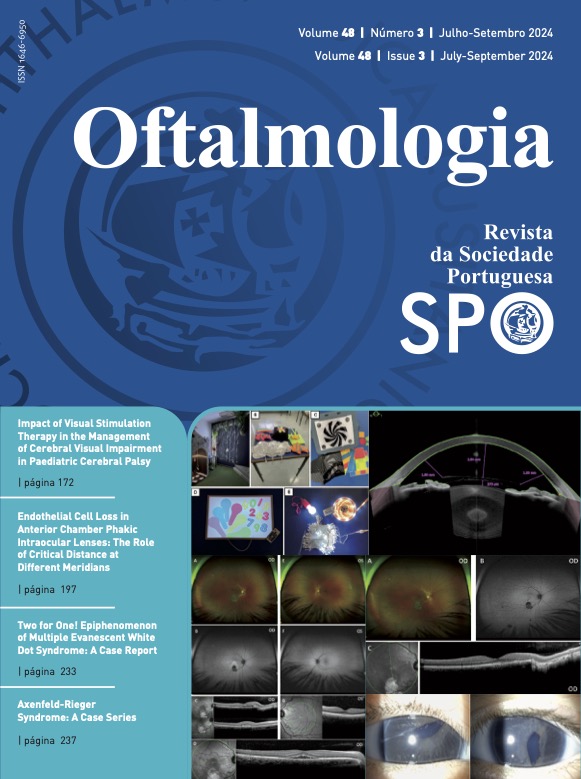Axenfeld-Rieger Syndrome: A Case Series
DOI:
https://doi.org/10.48560/rspo.33210Keywords:
Anterior Eye Segment/abnormalities, Eye Abnormalities, Eye Diseases, Hereditary, Forkhead Transcription Factors/genetics, Glaucoma/genetics, Homeobox Protein PITX2, Homeodomain Proteins/geneticsAbstract
Axenfeld-Rieger syndrome (ARS) is a genetic disorder characterized by two key components: anterior segment dysgenesis and systemic abnormalities.Regarding ocular features, posterior embryotoxon (anterior displacement of Schwalbe’s line) is a hallmark. Rieger anomaly comprehends congenital iris abnormalities. When accompanied by systemic findings such as facial bone defects, odontological, pituitary or umbilical abnormalities, the condition is referred to as Rieger syndrome. Axenfeld anomaly and Rieger syndrome present simultaneously make the diagnosis of ARS. In rare cases, hearing loss and cardiac defects may also appear.
Patients with ARS have an increased risk of developing glaucoma due to impaired drainage of aqueous humor. ARS is typically inherited as autosomal dominant but can also occur sporadically. Mutations in PITX2, FOXC1, PAX6, FOXO1A, and CYP1B1 genes underlie ARS’s genetic diversity. The objective is to present clinical manifestations, treatment approaches, and outcomes of ARS, contributing to its understanding and management. We present a case series of patients with ARS from the ophthalmology department of Hospital de São João, Porto, Portugal. Five patients with ARS with different variants involving PITX2 and FOXC1 genes, in heterozygosity, are presented: a two-year-old girl with a deletion of PITX2 gene; a seven-year-old girl and her forty-six-year-old mother with a duplication of exon 1 of FOXC1 gene; a eleven-year-old boy with deletion and substitution of FOXC1 gene; and a fifty-seven-year-old male with a deletion of the exon 1 of FOXC1 gene.
Posterior embryotoxon, corectopia and iris hypoplasia are prevalent among the majority of patients. One patient exhibits mild ocular abnormalities. Notably, three patients have developed glaucoma, with two requiring ocular surgery. The eldest patient, most probably attributable to a delayed diagnosis, is the only individual with a substantial degree of visual impairment. Systemic involvement is variable among patients and includes mostly hypertelorism, sensorineural hearing loss and cardiac abnormalities.
To conclude, our series highlights the diverse clinical presentations and challenges faced by affected individuals. As glaucoma management plays a pivotal role in mitigating potential vision loss in these cases, our findings underscore the paramount importance of early diagnosis and meticulous glaucoma management.
Downloads
References
Seifi M, Walter MA. Axenfeld-Rieger syndrome. Clin Genet. 2018;93:1123-30. doi: 10.1111/cge.13148.
Chang TC, Summers CG, Schimmenti LA, Grajewski AL. Axenfeld-Rieger syndrome: new perspectives. Br J Ophthalmol. 2012;96:318-22. doi: 10.1136/bjophthalmol-2011-300801.
Gripp KW, Hopkins E, Jenny K, Thacker D, Salvin J. Cardiac anomalies in Axenfeld-Rieger syndrome due to a novel FOXC1 mutation. Am J Med Genet A. 2013;161A:114-9. doi: 10.1002/ajmg.a.35697.
Yamazaki H, Nakamura T, Hosono K, Yamaguchi T, Hiratsuka Y, Hotta Y, et al. Sensorineural hearing loss and hypoplastic cochlea in Axenfeld-Rieger syndrome with FOXC1 mutation. Auris Nasus Larynx. 2021;48:1204-8. doi: 10.1016/j.anl.2020.07.006.
Wu CW, Mann N, Nakayama M, Connaughton DM, Dai R, Kolvenbach CM, et al. Phenotype expansion of heterozygous FOXC1 pathogenic variants toward involvement of congenital anomalies of the kidneys and urinary tract (CAKUT). Genet Med. 2020;22:1673-81. doi: 10.1038/s41436-020-0844-z.
Cunningham ET Jr, Eliott D, Miller NR, Maumenee IH, Green WR. Familial Axenfeld-Rieger anomaly, atrial septal defect, and sensorineural hearing loss: a possible new genetic syndrome. Arch Ophthalmol. 1998;116:78-82. doi: 10.1001/archopht.116.1.78.
Strungaru MH, Dinu I, Walter MA. Genotype-phenotype correlations in Axenfeld-Rieger malformation and glaucoma patients with FOXC1 and PITX2 mutations. Invest Ophthalmol Vis Sci. 2007;48:228-37. doi: 10.1167/iovs.06-0472.
Zhou L, Wang X, An J, Zhang Y, He M, Tang L. Genotype-phenotype association of PITX2 and FOXC1 in Axenfeld-Rieger syndrome. Exp Eye Res. 2023;226:109307. doi: 10.1016/j.exer.2022.109307.
Tümer Z, Bach-Holm D. Axenfeld-Rieger syndrome and spectrum of PITX2 and FOXC1 mutations. Eur J Hum Genet. 2009;17:1527-39. doi: 10.1038/ejhg.2009.93.
Lehmann OJ, Ebenezer ND, Ekong R, Ocaka L, Mungall AJ, Fraser S, et al. Ocular developmental abnormalities and glaucoma associated with interstitial 6p25 duplications and deletions. Invest Ophthalmol Vis Sci. 2002;43:1843-9.
Phillips JC, del Bono EA, Haines JL, Pralea AM, Cohen JS, Greff LJ, et al. A second locus for Rieger syndrome maps to chromosome 13q14. Am J Hum Genet. 1996;59:613-9.
Riise R, Storhaug K, Brøndum-Nielsen K. Rieger syndrome is associated with PAX6 deletion. Acta Ophthalmol Scand. 2001;79:201-3. doi: 10.1034/j.1600-0420.2001.079002201.x. Erratum in: Acta Ophthalmol. 2009;87:923. doi: 10.1111/j.17553768.2009.01696.x.
Li Y, Liu J, Tian Q, Ma X, Zhao Y, Bi H. Axenfeld-Rieger syndrome combined with ectropion uveae and pigment dispersion syndrome: A case report. Medicine. 2023;102:e32869. doi: 10.1097/MD.0000000000032869.
Ninios K, Jonescu-Cuypers CP, Seitz B. Glaukome bei primären Irisveränderungen. Axenfeld-Rieger-Syndrome, ICE-Syndrome (essenzielle Irisatrophie, Chandler-Syndrom, Cogan-Reese-Syndrom), Aniridie. Ophthalmologe. 2011;108:585-93; quiz 594. German. doi: 10.1007/s00347-011-2372-3.
Yu Chan JY, Choy BN, Ng AL, Shum JW. Review on the management of primary congenital glaucoma. J Curr Glaucoma Pract. 2015;9:92-9. doi: 10.5005/jp-journals-10008-1192.
McKinnon SJ, Goldberg LD, Peeples P, Walt JG, Bramley TJ. Current management of glaucoma and the need for complete therapy. Am J Manag Care. 2008;14:S20-7.
Downloads
Published
How to Cite
Issue
Section
License
Copyright (c) 2024 Revista Sociedade Portuguesa de Oftalmologia

This work is licensed under a Creative Commons Attribution-NonCommercial 4.0 International License.
Do not forget to download the Authorship responsibility statement/Authorization for Publication and Conflict of Interest.
The article can only be submitted with these two documents.
To obtain the Authorship responsibility statement/Authorization for Publication file, click here.
To obtain the Conflict of Interest file (ICMJE template), click here





